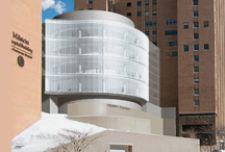
An artist's rendering of NewYork-Presbyterian's future heart center.
While enormous pressure may be the norm for cardiac surgeons, the stakes are particularly high when the life of a former U.S. president is on the line. And when Bill Clinton underwent quadruple bypass surgery in 2004, all eyes were on the heart specialists at NewYork-Presbyterian Hospital in New York City.
The fact that, two years later, Clinton was a guest of honor at the groundbreaking ceremony for the hospital’s new heart center might be seen as a testament to the type of care he received.
Little wonder that NewYork-Presbyterian Hospital and Columbia University Medical Center are major participants again in the annual Transcatheter Cardiovascular Therapeutics (TCT) scientific symposium this fall in Washington, D.C. — Columbia University is affiliated with the Cardiovascular Research Foundation, which hosts the event.
Jeffrey W. Moses, M.D., director of the Center for Interventional Vascular Therapy at NewYork-Presbyterian/Columbia University Medical Center, says the hospital will be testing many of the latest interventional and surgical devices during the much anticipated live case sessions during the seven-day symposium, running from Oct. 22 to 27.
Last year TCT presented live video transmissions of more than 100 live patient cases from 28 international sites.
Dr. Moses said those attending can expect several cases demonstrating the latest modifications in the coronary arena, including drug-eluting stent procedures, as well as some emphasis on carotid stenting.
TCT co-director Gary Mintz, M.D., concurred that this year’s convention will have a special focus on coronary intervention.
“So the people who are interested in one or the other can literally decide that week to only concentrate on their areas of interest,” he said.
Dr. Moses is especially looking forward to a new valve replacement procedure.
“We’ll be testing new devices for closing mitral regurgitation with clips, new technology for injecting cells into the myocardium and magnetically guided interventions,” Dr. Moses said.
Staying on the Edge
A cardiovascular leader off-camera as well, NewYork-Presbyterian/Columbia is a frequent participant in clinical trials — just a few of its latest include the Evalve Cardiovascular Valve Repair System for the treatment of mitral regurgitation and the HeartMate II Left Ventricular Assist System (LVAS) for advanced-stage heart failure patients.
Dr. Moses says these kinds of trials are part of what keeps the hospital on the leading edge of cardiac research.
“"We are involved in clinical trials in virtually every area of interventional cardiology; many of the national PIs for these trials are right here at the Center for Interventional Vascular Therapy,” he said. “Our physicians are involved in the writing, designing, and executing of many of these trials."
The Evalve system is currently in its first phase and the HeartMate II is in phase II.
Ranked seventh in the nation in heart surgery and sixth on the Honor Roll of America’s Best Hospitals by U.S. News & World Report, NewYork-Presbyterian is one of 30 hospitals nationwide to be designated an accredited Chest Pain Center. More than 8,000 patients with chest pain are treated there each year.
Comprised of two centers, NewYork-Presbyterian Hospital/Columbia University and NewYork-Presbyterian Hospital/Weill Cornell, the hospital is affiliated with two Ivy League medical institutions — Columbia University College of Physicians & Surgeons and Weill Medical College of Cornell University.
Dr. Moses says the new Vivian and Seymour Milstein Family Heart Center — scheduled to open in 2009 — will have multiple functions, serving as an educational center and providing more intensive care space.
He also said it will be an ambulatory interface for the public.
“That means you will enter this building as an outpatient and leave as an outpatient — you won’t really get involved with the inpatient part of the hospital,” Dr. Moses said. “It will be like going to an outpatient facility.”
He said he believes the center will emerge as a functionally integrated service.
“Hopefully it will be a hospital within a hospital, and all the cardiac services that it’s built for will have a single administrative line,” Dr. Moses said.
Herbert Pardes, M.D., NewYork-Presbyterian/Columbia’s president and chief executive officer, said the center will help “forge a new era in medicine, offering patients access to care with expanded ambulatory, cardiology and diagnostic services.”
“By moving diagnosis and treatment under one roof, we will increase efficiency and convenience for all of our patients from New York and around the world,” he said at the heart center’s groundbreaking ceremony. “The new center also allows us to increase our capacity for superb outpatient care, which is a growing trend as we strengthen minimally invasive approaches to heart care.”
Jeffrey W. Moses, M.D., professor of Medicine at Columbia University College of Physicians and Surgeons, is director of the Center for Interventional Vascular Therapy at NewYork-Presbyterian Hospital/Columbia University Medical Center. He is also director of the Cardiac Catheterization Lab at NewYork-Presbyterian/Columbia University Medical Center. An internationally recognized interventional cardiologist, Dr. Moses has performed more than 12,000 interventional procedures, authored over 600 publications and served as lead investigator for numerous national and international clinical studies that have demonstrated the effectiveness and safety of coronary stent placement.


